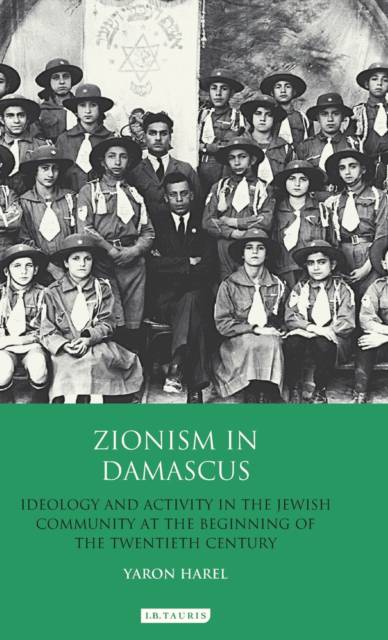
- Afhalen na 1 uur in een winkel met voorraad
- Gratis thuislevering in België vanaf € 30
- Ruim aanbod met 7 miljoen producten
- Afhalen na 1 uur in een winkel met voorraad
- Gratis thuislevering in België vanaf € 30
- Ruim aanbod met 7 miljoen producten
Zoeken
Zionism in Damascus
Ideology and Activity in the Jewish Community at the Beginning of the Twentieth Century
Yaron Harel
€ 296,95
+ 593 punten
Omschrijving
The beginning of the twentieth century was a period that saw far-reaching change in the political and geographical landscapes of the Middle East. From the impact of the revolution of the Young Turks in 1908 to the devastation of World War I and the subsequent British and French mandates in the region, Syria was particularly affected. Yaron Harel adds to the understanding of this period by examining an understudied aspect: the rise of Zionist intellectual thought and activity in the Syrian capital of Damascus. Through meticulous research, Harel highlights the fact that, during these difficult years, those parts of the Jewish community affected by the economic collapse of October 1875 were able to take solace in the rising trend of Zionist thought. He therefore demonstrates Zionism in Damascus was not a religiously motivated movement, but rather was class related. In particular, Harel examines what avenues of identity were available for the Jewish community in Damascus at a time when identification with Arab nationalism was on the rise in Syria. Were they to be Jewish - Arab? Or Jewish - Zionist?It is by examining issues such as Zionist education, health provision, women's political engagement and philanthropic activity that Harel offers an in-depth analysis of Zionism in the context of Jewish society.
He also offers an account of the eventual dismantling of the movement, in the wake of the establishment of the French mandate. With external forces beyond Syria's borders beginning to have an effect (such as the King - Crane Commission and efforts to establish a Jewish Homeland taking shape), as well as internal struggles within Zionist circles in Syria itself, the leaders of the Zionist movement in Damascus began to leave the city. Zionism in Damascus tracks those involved in this ideological wave (Zionist intellectuals, journalists, secular thinkers and rabbis) from its early days to the eventual abandonment of Damascus following the Balfour Declaration and the establishment of the French Mandate.
He also offers an account of the eventual dismantling of the movement, in the wake of the establishment of the French mandate. With external forces beyond Syria's borders beginning to have an effect (such as the King - Crane Commission and efforts to establish a Jewish Homeland taking shape), as well as internal struggles within Zionist circles in Syria itself, the leaders of the Zionist movement in Damascus began to leave the city. Zionism in Damascus tracks those involved in this ideological wave (Zionist intellectuals, journalists, secular thinkers and rabbis) from its early days to the eventual abandonment of Damascus following the Balfour Declaration and the establishment of the French Mandate.
Specificaties
Betrokkenen
- Auteur(s):
- Uitgeverij:
Inhoud
- Aantal bladzijden:
- 376
- Taal:
- Engels
- Reeks:
Eigenschappen
- Productcode (EAN):
- 9781780766706
- Verschijningsdatum:
- 18/02/2015
- Uitvoering:
- Hardcover
- Formaat:
- Genaaid
- Afmetingen:
- 142 mm x 216 mm
- Gewicht:
- 589 g

Alleen bij Standaard Boekhandel
+ 593 punten op je klantenkaart van Standaard Boekhandel
Beoordelingen
We publiceren alleen reviews die voldoen aan de voorwaarden voor reviews. Bekijk onze voorwaarden voor reviews.








